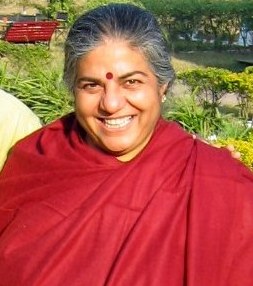Wall Street Wolves and Rethinking Economic Growth
Jan 3rd, 2014 | By admin | Category: Economics and GDPBy Suzanne York, www.howmany.org
It’s time for a fresh start on the year. Which makes it a good time to take a hard look at how the global economy is structured, and how that is working for people (the 99%, not the 1%) and the environment.
There is an obsession with economic growth that flies in the face of the reality of finite natural resources, not to mention human well-being. A serious and public rethinking of the “more growth” mantra is needed.
Below is an excerpt of an op-ed written by Vandana Shiva, a respected physicist and environmental activist, for the UK Guardian this past November. In it she succinctly hit on the main reasons why endless growth is not an option for a “sustainable” world.Dr. Shiva started out with the following:
Limitless growth is the fantasy of economists, businesses and politicians. It is seen as a measure of progress. As a result, gross domestic product (GDP), which is supposed to measure the wealth of nations, has emerged as both the most powerful number and dominant concept in our times. However, economic growth hides the poverty it creates through the destruction of nature, which in turn leads to communities lacking the capacity to provide for themselves.
The concept of growth was put forward as a measure to mobilise resources during the second world war. GDP is based on creating an artificial and fictitious boundary, assuming that if you produce what you consume, you do not produce. In effect , “growth” measures the conversion of nature into cash, and commons into commodities.
Thus nature’s amazing cycles of renewal of water and nutrients are defined into nonproduction. The peasants of the world, who provide 72% of the food, do not produce; women who farm or do most of the housework do not fit this paradigm of growth either. A living forest does not contribute to growth, but when trees are cut down and sold as timber, we have growth. Healthy societies and communities do not contribute to growth, but disease creates growth through, for example, the sale of patented medicine.
She continued:
Both ecology and economics have emerged from the same roots – “oikos”, the Greek word for household. As long as economics was focused on the household, it recognised and respected its basis in natural resources and the limits of ecological renewal. It was focused on providing for basic human needs within these limits. Economics as based on the household was also women-centered. Today, economics is separated from and opposed to both ecological processes and basic needs. While the destruction of nature has been justified on grounds of creating growth, poverty and dispossession has increased. While being non-sustainable, it is also economically unjust.The dominant model of economic development has in fact become anti-life. When economies are measured only in terms of money flow, the rich get richer and the poor get poorer. And the rich might be rich in monetary terms – but they too are poor in the wider context of what being human means.
Meanwhile, the demands of the current model of the economy are leading to resource wars oil wars, water wars, food wars. There are three levels of violence involved in non-sustainable development. The first is the violence against the earth, which is expressed as the ecological crisis. The second is the violence against people, which is expressed as poverty, destitution and displacement. The third is the violence of war and conflict, as the powerful reach for the resources that lie in other communities and countries for their limitless appetites.
Dr. Shiva ended with words of wisdom that we all should heed, but perhaps our politicians and decision-makers most of all. Her concluding sentence was “We need to remember that the real currency of life is life itself.”
As conflicts rage around the world and people struggle in the face of growing inequity and inequality, the answer to improving life isn’t more unsustainable economic growth. Yes, some growth is good, but in the things people and the planet need for a healthy world, not in what fills the bank accounts of the 99 percent.
Suzanne York is a senior writer with the Institute for Population Studies.


